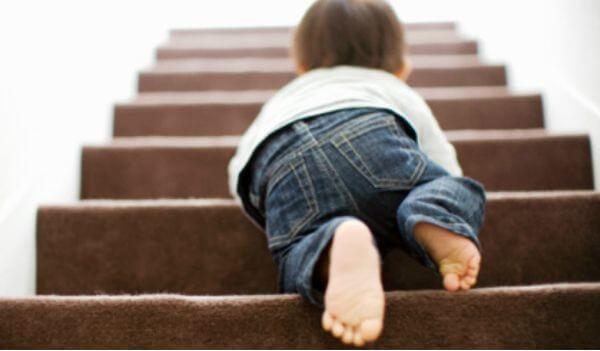546
Ekaterina Burmistrova: How to teach and how to teach independence
Parents often hear, as a necessary and useful to the child independence. But not many parenting books says something about how hard it is for the parents this independence. Psychologist and mother of 10 children Ekaterina Burmistrova – about how the family to facilitate the development of children's independence. There are in developmental psychology, the notion of "zone of proximal development" (personal ZPD). Suppose a child has a certain skill X – able to wear shoes with Velcro fasteners. The following skill – (boots with laces) – he can't reach. Among these skills there is a certain distance. It will take some time, and the child will be able to do it. But this will need time. And if he's not going to help, it will be the same time.
But an adult can put the intermediate point X1. If X – shoes with Velcro, shoes with laces, then X1 can be doll with laces, or shoes on the feet of the child, or pressurewire wooden buttons wooden needle.
All particular skill of lacing where you want to show your child how it's done. And setting the closest skill (the child himself would not have guessed that you can learn to tie my shoes on a different subject – the step child is not possible), i.e. the fact that the parents came up and helped – this is the zone of proximal development. Her parents had made, and it will allow the child to move faster over other, less time. And this applies to pretty much everything, any skill.
For example, the child knows the letters (X) and that the child independently reads. These are two very different skills, and the child may know the letter in 3 years, and start reading in 7 years.
And that this distance has become a master, you need to break the distance, not on one but on several lines, and not to do for the child, but at every stage to come up with something (X1, x2, X3...) that will help the child.
This can be writing notes, it can be big books, clay, inscriptions on the objects can be came in the mail a letter which can only be read by the child, is something that makes it more achievable endpoint. However, we do not deprive the child of independence, we are not doing this for him, but for myself mentally divide this skill into parts and make it more accessible for the child.

It is very important to see that the autonomy need. For example, the child is not able to walk himself to the store, and you want to know how. But the magic wand we have. And often need to build this path and create the zone of proximal development, or the child will not be at the point of the skill: he will be scared to cross the street, he will fear the shop, he will lose the money before reaching the entrance to the store... And one of the key parenting skills associated with independence is to think about where the zone of proximal development, and how our help can not deprive the child of autonomy.
Lessons. We do homework with your child and want the child himself. Easy if you say, "now you do," and he took it and began to do. Such things also happen, but, unfortunately, rare. And often, if you have formed one skill you need time and splitting into sub-items to form another. But if you do everything for the child, it will last indefinitely, as long as you do not "move" at some point, and will not refuse to do anything at all.
Therefore, understanding where to give independence, is the parent fine art. For this you need to understand how children grow.
Very often, when a child first senior, we do not know what step he will be the next. We know that you have the skill, and what skill Have to wait on, we just don't know. We don't know what is possible through six months, and at what age is normal. And this is important, because if we don't know what to expect, we can't create the steps.
It is also important that we have our own childhood that was normal in terms of independence compared to the childhood of our children. And we have kids around the children of friends, children of relatives, children in the yard.
Very useful to have a "water-borne" environment, ages to at least the edge of the eye to see (on the example of other children), what is the child of another age: if your a 1.5 – what the child is like 2.5 years, if your 5 – on what the child is like 7 years old. And for the sake of these impressions is not a pity to spend the effort.

Very useful to see how children look older because sometimes it can be a discovery: "How it might 7 years have salad to cut (anything to make)! And we do not think it is at all possible..."
Plus there are books skills for ages ("the Diary of a kindergarten teacher; a book for children with down syndrome (don't worry!) – "Small steps", 9 booklets, each skill is useful for those who have a child not more than 5 years).
Sometimes the situation is hard refusal by child to take a particular action for themselves. Parents for independence, created a zone of proximal development and all the conditions – and the child doesn't want to. May not want without words, or says: "I am small" or expresses the denial of their behavior. And here it is necessary to think. As it is parents tend to do everything for the child, there are parents, absolutely bent on independence: I want my child did everything himself. A child, maybe it's not suitable.
If the child refuses to self-reliance, and you understand that it is necessary for this build possible steps), then perhaps it is age regression, temporary or prolonged. Regression is when someone makes a step backwards in the development of the child a great behave like little (asks for the pacifier, starts to Lisp). This may be a temporary regression from moving to another place, or that came a new nanny or a new teacher at the school, or the mother went out to work – or, conversely, quit my job and sit at home.
Any major change in a child's life can be a source of stress and regress temporarily, a temporary step back. In a state of regression the children react very poorly to attempts to give them autonomy: adults continue to insist, and the children regress even more. The insistence of the parents leads to a further pullback.
If you know what is the source of regression, it is necessary to wait from a half to three months (adjustment period). Preferably this source to be detected.
For example, a child who went to school or kindergarten, or have moved into a stronger senior classes in school, often at home for a very long time in a state of regression. He is in the garden or in the school is laid out, no complaints against him, he does listen, but comes home. At home he does not even 2\3 of what they were doing before I went to this place.
If to press, the situation may worsen. If you do not push, she may stay forever, to gain a foothold. So you need to competently make regressive behavior at home for the child became unprofitable. Need to pick up the key that your child will fit someone it would be normal if the parent will begin to regret and to Lisp, and someone is going to fix the regressive behavior, then you need another way.
Parents always a lot of attempts: one day I tried one the other day, something suitable, and you will see the correct response. It is important not to be afraid to experiment and it is important that this behavior will eventually become something more adult, not regressed further. And it is useful to understand the source of stress: if three months have passed and all your attempts are futile, maybe the garden too much, or in the garden is something that the child is unbearable.
It's the same with students: at school everything is fine, copes with the lessons in school and at home of the scandalous, very diffused, not concentrated or has ceased to do what was done before. But with students more difficult because their schedule is such that a concentration of homes are not child, every day is exhausting as an athlete of Olympic reserve. If the whole strength is laid out into house, perhaps home is just inappropriate behavior.

The child who is "insane", it is useless to bring up, because if the child is not in the area of opportunity of hearing, to educate his useless power spent, emotions spent, and nothing will. If our parenting style is that the child is constantly in the area of inadequacy is the big question: at what expense?
The development of the following skills (from X to Y) requires strength and energy. To learn to read, to do their own lessons, tying shoelaces requires power. If your child's schedule is made so that these forces does not remain, it will not be able to master new skills. This, too, is effort: effort not only in school or in the pool, but adoption is also an effort. If he has no energy, you require to useless.
Therefore, systematically overwhelmed the child does not teach independence, until in adolescence he found no remedy to go to your other inner reality. But this is possible only by 10-11 years or through extreme distraction. On the development of life-skills require energy and time – and the parents and the child. published
P. S. And remember, only by changing their consumption — together we change the world! © Join us at Facebook , Vkontakte, Odnoklassniki
Source: pravmir.ru/priuchaem-detey-k-samostoyatelnosti-sovetyi-ot-ekaterinyi-burmistrovoy/
But an adult can put the intermediate point X1. If X – shoes with Velcro, shoes with laces, then X1 can be doll with laces, or shoes on the feet of the child, or pressurewire wooden buttons wooden needle.
All particular skill of lacing where you want to show your child how it's done. And setting the closest skill (the child himself would not have guessed that you can learn to tie my shoes on a different subject – the step child is not possible), i.e. the fact that the parents came up and helped – this is the zone of proximal development. Her parents had made, and it will allow the child to move faster over other, less time. And this applies to pretty much everything, any skill.
For example, the child knows the letters (X) and that the child independently reads. These are two very different skills, and the child may know the letter in 3 years, and start reading in 7 years.
And that this distance has become a master, you need to break the distance, not on one but on several lines, and not to do for the child, but at every stage to come up with something (X1, x2, X3...) that will help the child.
This can be writing notes, it can be big books, clay, inscriptions on the objects can be came in the mail a letter which can only be read by the child, is something that makes it more achievable endpoint. However, we do not deprive the child of independence, we are not doing this for him, but for myself mentally divide this skill into parts and make it more accessible for the child.

It is very important to see that the autonomy need. For example, the child is not able to walk himself to the store, and you want to know how. But the magic wand we have. And often need to build this path and create the zone of proximal development, or the child will not be at the point of the skill: he will be scared to cross the street, he will fear the shop, he will lose the money before reaching the entrance to the store... And one of the key parenting skills associated with independence is to think about where the zone of proximal development, and how our help can not deprive the child of autonomy.
Lessons. We do homework with your child and want the child himself. Easy if you say, "now you do," and he took it and began to do. Such things also happen, but, unfortunately, rare. And often, if you have formed one skill you need time and splitting into sub-items to form another. But if you do everything for the child, it will last indefinitely, as long as you do not "move" at some point, and will not refuse to do anything at all.
Therefore, understanding where to give independence, is the parent fine art. For this you need to understand how children grow.
Very often, when a child first senior, we do not know what step he will be the next. We know that you have the skill, and what skill Have to wait on, we just don't know. We don't know what is possible through six months, and at what age is normal. And this is important, because if we don't know what to expect, we can't create the steps.
It is also important that we have our own childhood that was normal in terms of independence compared to the childhood of our children. And we have kids around the children of friends, children of relatives, children in the yard.
Very useful to have a "water-borne" environment, ages to at least the edge of the eye to see (on the example of other children), what is the child of another age: if your a 1.5 – what the child is like 2.5 years, if your 5 – on what the child is like 7 years old. And for the sake of these impressions is not a pity to spend the effort.

Very useful to see how children look older because sometimes it can be a discovery: "How it might 7 years have salad to cut (anything to make)! And we do not think it is at all possible..."
Plus there are books skills for ages ("the Diary of a kindergarten teacher; a book for children with down syndrome (don't worry!) – "Small steps", 9 booklets, each skill is useful for those who have a child not more than 5 years).
Sometimes the situation is hard refusal by child to take a particular action for themselves. Parents for independence, created a zone of proximal development and all the conditions – and the child doesn't want to. May not want without words, or says: "I am small" or expresses the denial of their behavior. And here it is necessary to think. As it is parents tend to do everything for the child, there are parents, absolutely bent on independence: I want my child did everything himself. A child, maybe it's not suitable.
If the child refuses to self-reliance, and you understand that it is necessary for this build possible steps), then perhaps it is age regression, temporary or prolonged. Regression is when someone makes a step backwards in the development of the child a great behave like little (asks for the pacifier, starts to Lisp). This may be a temporary regression from moving to another place, or that came a new nanny or a new teacher at the school, or the mother went out to work – or, conversely, quit my job and sit at home.
Any major change in a child's life can be a source of stress and regress temporarily, a temporary step back. In a state of regression the children react very poorly to attempts to give them autonomy: adults continue to insist, and the children regress even more. The insistence of the parents leads to a further pullback.
If you know what is the source of regression, it is necessary to wait from a half to three months (adjustment period). Preferably this source to be detected.
For example, a child who went to school or kindergarten, or have moved into a stronger senior classes in school, often at home for a very long time in a state of regression. He is in the garden or in the school is laid out, no complaints against him, he does listen, but comes home. At home he does not even 2\3 of what they were doing before I went to this place.
If to press, the situation may worsen. If you do not push, she may stay forever, to gain a foothold. So you need to competently make regressive behavior at home for the child became unprofitable. Need to pick up the key that your child will fit someone it would be normal if the parent will begin to regret and to Lisp, and someone is going to fix the regressive behavior, then you need another way.
Parents always a lot of attempts: one day I tried one the other day, something suitable, and you will see the correct response. It is important not to be afraid to experiment and it is important that this behavior will eventually become something more adult, not regressed further. And it is useful to understand the source of stress: if three months have passed and all your attempts are futile, maybe the garden too much, or in the garden is something that the child is unbearable.
It's the same with students: at school everything is fine, copes with the lessons in school and at home of the scandalous, very diffused, not concentrated or has ceased to do what was done before. But with students more difficult because their schedule is such that a concentration of homes are not child, every day is exhausting as an athlete of Olympic reserve. If the whole strength is laid out into house, perhaps home is just inappropriate behavior.

The child who is "insane", it is useless to bring up, because if the child is not in the area of opportunity of hearing, to educate his useless power spent, emotions spent, and nothing will. If our parenting style is that the child is constantly in the area of inadequacy is the big question: at what expense?
The development of the following skills (from X to Y) requires strength and energy. To learn to read, to do their own lessons, tying shoelaces requires power. If your child's schedule is made so that these forces does not remain, it will not be able to master new skills. This, too, is effort: effort not only in school or in the pool, but adoption is also an effort. If he has no energy, you require to useless.
Therefore, systematically overwhelmed the child does not teach independence, until in adolescence he found no remedy to go to your other inner reality. But this is possible only by 10-11 years or through extreme distraction. On the development of life-skills require energy and time – and the parents and the child. published
P. S. And remember, only by changing their consumption — together we change the world! © Join us at Facebook , Vkontakte, Odnoklassniki
Source: pravmir.ru/priuchaem-detey-k-samostoyatelnosti-sovetyi-ot-ekaterinyi-burmistrovoy/
8 unusual, but effective ways to save water
Tasty and healthy desserts: Pumpkin pie with orange and carrot cookies






















